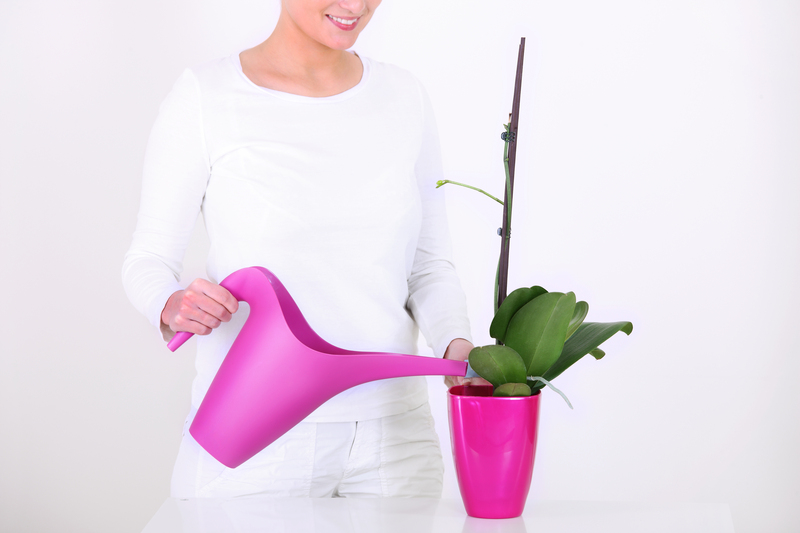Recycling Kitchen Waste into Rich Soil
Posted on 19/08/2025
Recycling Kitchen Waste into Rich Soil: A Comprehensive Guide
Recycling kitchen waste into rich, fertile soil is an eco-friendly solution that benefits both the environment and your garden. Through kitchen waste composting, you can transform food scraps into valuable organic matter, dramatically reducing landfill waste and producing a nutrient-rich soil amendment. This detailed guide explores how to recycle kitchen waste into rich soil--from the basics of kitchen waste composting, to the step-by-step process, to creative ideas and solutions for common issues.

Why Recycle Kitchen Waste?
Every year, households throw away tons of kitchen scraps that could be repurposed. Recycling kitchen garbage into compost minimizes landfill usage and methane emissions while creating homemade fertilizer for gardens and houseplants. Plus, it is a sustainable living practice that is easy to start and highly rewarding.
Environmental Advantages
- Reduces landfill waste: Organic matter accounts for a large portion of household garbage. Recycling this material lightens the burden on landfills.
- Decreases greenhouse gas emissions: Composting kitchen waste lowers methane output from fermenting food in landfills.
- Returns nutrients to the soil: Compost enriches soils, supports plant growth, and increases biodiversity below ground.
Benefits for Your Garden
- Improved soil structure: Recycling kitchen food scraps creates organic matter that aerates heavy soils and helps sandy soils retain moisture.
- Natural fertilizer: Compost is rich in key nutrients for healthy plants, reducing the need for chemical fertilizers.
- Encourages beneficial organisms: Worms and microbes thrive in compost-enriched soils, promoting plant growth.
What Can Be Recycled from the Kitchen?
Not all kitchen waste is suitable for composting, but a surprising variety can be successfully transformed into rich soil amendment.
Suitable Kitchen Scraps
- Fruit and vegetable peels and scraps (except for citrus in large amounts)
- Coffee grounds and filters
- Tea bags (check they're plastic-free)
- Eggshells (crushed for faster decomposition)
- Stale bread, grains, pasta, and rice (in small quantities)
- Nuts and shells (avoiding salty or seasoned varieties)
- Paper towels and napkins (if free of chemicals or grease)
- Small amounts of cooked food (without meat, dairy or sauces)
What to Avoid
- Meat, fish, and dairy products: These attract pests and can create odors.
- Oil and greasy foods: Slow down composting and encourage rodents.
- Large quantities of citrus peel: Can make the compost too acidic.
- Bones: Difficult and slow to decompose.
- Treated or glossy paper products: May contain chemicals.
The Process of Recycling Kitchen Waste into Rich Soil
Step 1: Collection - Start at the Source
Place a designated kitchen waste bin or compost container in your kitchen. Many compost pails are designed to sit on countertops and have charcoal filters to eliminate odors. Promptly collecting scraps encourages regular recycling of kitchen leftovers.
Step 2: Choose a Composting Method
There isn't a one-size-fits-all approach to recycling kitchen waste into fertile soil. Your best method will depend on your available space, lifestyle, and the amount of waste you produce. Consider these popular options:
- Backyard Composting: Best for those with outdoor space. A traditional compost heap or bin combines greens (like kitchen scraps) and browns (like leaves or cardboard).
- Vermicomposting: Uses worms, typically red wigglers, to break down kitchen scraps quickly and efficiently, producing premium worm castings.
- Bokashi Composting: An indoor, anaerobic fermentation process that can handle small amounts of meat and dairy. It uses a specialized inoculant to ferment kitchen waste before it finishes composting in soil.
- Indoor Electric Composters: Appliances that grind and heat kitchen waste, producing ready-to-use plant food within hours or days.
Step 3: Compost Pile Maintenance - How to Nurture Your Soil
Mix kitchen waste with carbon-rich "brown" materials (dry leaves, shredded newspaper, cardboard) to balance moisture and prevent unpleasant smells. Aim for a 2:1 or 3:1 ratio of browns to greens. Turn the pile every 1-2 weeks to aerate; moisture should resemble a wrung-out sponge.
- Monitor moisture: Too wet promotes odor and flies; too dry slows breakdown. Add water or dry leaves accordingly.
- Chop scraps: Smaller pieces speed up decomposition.
- Layer materials: Alternating green (kitchen waste) and brown layers enhances aeration and breakdown.
Step 4: Harvest and Use Your Soil-enriching Compost
Compost is ready when it's dark, crumbly, and earthy-smelling, with no recognizable scraps. It usually takes 2-6 months, depending on method and conditions. Sift out large bits to return to the pile, then apply your recycled kitchen waste compost:
- As garden soil amendment -- dig into vegetable beds or flower borders
- Mulch around trees and shrubs
- Top-dressing for lawns or houseplants
Tips for Effective Kitchen Waste Recycling
Take your kitchen waste composting to the next level with these best practices:
- Use a covered bin to keep pests and smells at bay.
- Balance greens and browns -- too many kitchen scraps and the pile gets slimy; too few and it won't break down.
- Turn and mix the pile regularly for fast, even composting.
- Locate outdoor bins where there's partial sun and easy access year-round.
- Be patient: Good compost takes time to mature, but the benefits are well worth it!
Common Troubleshooting: Problems and Solutions
Dealing with Odors
Bad smells are a sign of improper decomposition. How to fix? Add more dry carbon materials, cut back on overly wet scraps, and turn the pile for more air.
Fruit Flies and Pests
- Cover kitchen waste with a generous layer of browns each time you add it.
- Never add meat or greasy foods.
- Place your bin on a hard surface away from doors and windows.
Slow Decomposition
- Chop or blend kitchen scraps for faster breakdown.
- Make sure your compost is damp but not soggy.
- Add more green materials if the pile is dry and brown, or more browns if too wet.
Indoor Kitchen Waste Composting Solutions
Don't have an outdoor space? Recycling kitchen waste into fertile soil is still possible indoors with these solutions:
Vermicomposting Indoors
- Use a worm bin kept under the sink or in a utility room.
- Feed your worms fruit and veggie scraps, coffee grounds, paper, and eggshells.
- Harvest worm castings every 3-6 months for use in potted plants or garden beds.
Bokashi Composting
- Utilizes a sealed bucket and bran-based inoculant to ferment kitchen waste, including small amounts of meat and dairy.
- The resulting "pre-compost" can be buried in soil or added to an outdoor bin for finishing.
Electric Food Waste Digesters
- Rapidly dehydrate and break down kitchen waste into a sterile, soil-like amendment.
- Ideal for apartments, with no outdoor pile needed.
Recycling Kitchen Waste: Frequently Asked Questions
Can I Compost Citrus Peels, Onion, and Garlic?
Yes, in moderation. Too much citrus can lower pH, and onions and garlic may deter worms--use sparingly.
Is Composting Smelly or Messy?
A balanced compost pile should have a fresh, earthy smell. Cover each batch of kitchen waste with browns and keep the bin tidy to avoid problems.
How Long Does It Take to Get Compost?
Depending on your method, composting can take as little as two months (vermicomposting) to six months or more (cold composting).
Can I Recycle Cooked Foods?
Small amounts of plant-based, oil-free cooked foods can be composted. Avoid anything with meat, dairy, or heavy sauces.

Creative Uses for Recycled Kitchen Waste Compost
- Top-dress houseplants with a layer of compost for a consistent nutrient source.
- Mix into seed-starting soil for a fertility boost.
- Add to lawn aeration holes to promote greener grass.
- Spread beneath mulch in vegetable and flower beds for healthier, more productive plants.
Conclusion: Turn Your Kitchen Trash Into Garden Treasure!
By recycling kitchen waste into rich soil, you create a sustainable circle: kitchen waste feeds the earth, which in turn feeds your plants. This practical and eco-friendly routine conserves resources, improves plant health, and fosters a greener planet. Whether you choose a backyard pile, a worm bin, or a countertop composter, the rich, dark compost you produce is a testament to the power of repurposing waste. Start recycling your kitchen scraps today and nurture the soil that nourishes your world!
For more tips and troubleshooting for kitchen waste recycling, bookmark this guide and discover more ways to make your household greener.
Latest Posts
Building an Herb Garden That Inspires and Heals
Turn Your Garden into a Restful Haven with Seating Excellence
Crafting a Resilient Garden: Protecting from Severe Weather Risks

